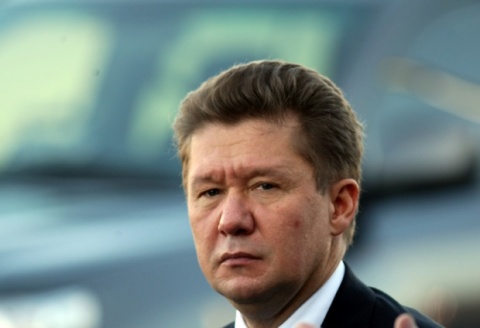
Turkey Gains Little, Ukraine Has Much to Lose in Ankara Backing Russian South Stream
Publication: Eurasia Daily Monitor Volume: 9 Issue: 5
By:

On December 30, Russian Prime Minister Vladimir Putin and Gazprom CEO Aleksei Miller announced that Turkey has authorized the construction of Gazprom’s South Stream pipeline through Turkey’s Black Sea exclusive economic zone, bypassing Ukraine en route to central Europe (Russian TV, Interfax, December 30; Russian prime minister’s website, December 31).
Turkey’s Energy Minister, Taner Yildiz, had handed the South Stream permits to Putin in Moscow two days earlier. Putin thanked the Turkish Prime Minister, Recep Tayyip Erdogan, for “this wonderful Christmas gift to Russia” (Interfax, December 28).
South Stream is nominally designed for up to 63 billion cubic meters (bcm) of gas annually, diverting transit from Ukraine and monopolizing markets and pipelines in Europe. The underwater section in the Black Sea is supposed to be built in four consecutive stages, each at some 15 bcm annually. Turkey’s Black Sea exclusive economic zone is the only possible route for South Stream from Russia to Europe (landfall point in Bulgaria).
Ankara’s “gift” is two-fold. Its go-ahead to South Stream strengthens Russia’s hand against Ukraine and Europe. Although nonviable as a gas project in its own right, South Stream is a major political tool for expanding Russian influence in Ukraine and Gazprom’s positions within the European Union.
Ukraine regards South Stream as a direct threat to Ukraine’s own gas transit system, the country’s number one national asset. That system carries some 110-120 bcm of Russian gas annually to Europe. The Ukrainian government takes the South Stream bypass threat at face value. It fears that Russia would shift its gas exports into South Stream, reducing the Ukrainian system to semi-idleness, loss of value and ultimate bankruptcy, unless Ukraine yields control of its transit system and even internal distribution networks to Gazprom.
Moscow proposes a deal along those lines to Ukraine. All Ukrainian governments irrespective of political color have resisted such a deal, until now. Turkey’s sudden green light, however, has suddenly increased the credibility and urgency of the South Stream bypass threat to Ukraine. It undercuts Ukraine’s bargaining position, with potentially devastating effect.
The Putin-Miller announcement on TV (see above) and follow-up actions can precipitate a Ukrainian cave-in at the January session of parliament. There, legislation is being drafted to allow Gazprom (in one form or another) to control Ukrainian pipelines. The government hopes that Russia would in that case renounce South Stream, continue using Ukraine’s transit system to Europe full-scale, and reduce the gas price to Ukraine, in return for control of pipelines.
Turkey’s move discourages the Ukrainian public from resisting a negotiated handover of pipelines to Russia. With South Stream poised to start in Turkish waters, many Ukrainians will conclude that a deal acceptable to Russia is preferable to no deal, disuse and decay of Ukraine’s pipelines.
Only six days earlier (December 22), Ukraine’s President Viktor Yanukovych and the government had held talks with Erdogan and the Turkish government in Ankara, inaugurating the two countries’ High Level Strategic Council (a Turkish initiative). Yanukovych remarked that “diversification of energy supplies, for Ukraine and Turkey, is our strategic goal that we will always be pursuing.” Ukraine and Turkey, he said, will establish a permanent joint working group on energy cooperation. “And any practical solutions on strategic projects will certainly not be a secret. As soon as they are agreed upon, we will announce them.” On December 23, Ukrainian Minister of Foreign Affairs Kostyantin Hryshchenko was a guest keynote speaker at the Turkish Foreign Affairs Ministry’s annual general meeting, by invitation from his Turkish counterpart Ahmet Davutoglu. They emphasized “unprecedented opportunities for Turkey-Ukraine strategic partnership in the Black Sea region (www.president.gov.ua, December 22, 23).
Did Turkish leaders inform their visiting Ukrainian counterparts about Ankara’s imminent decision for Russia on South Stream? When that became public, Hryshchenko twitted to complain that South Stream “is a political, not an economic project” (Interfax-Ukraine, December 29).
Yildiz claimed credit for Turkey opening this gas route to help Europe. On this basis he urged Brussels to open negotiations on the energy chapter in the dormant association agreement with Turkey. Sarcastically he claimed that South Stream, too, is a part of the EU’s Southern Gas Corridor (Haber Turkish TV cited by Interfax, December 29; Hurriyet, December 30).
Ukraine had barred South Stream from its own Black Sea exclusive economic zone. There is no corridor available between Ukraine’s and Turkey’s zones; they are directly adjacent to each other. Thus, Russia could only launch this project in Turkey’s zone with Turkish consent.
Ankara took several years to bargain with Moscow over a suitable reward. In August 2009, Erdogan and Putin agreed that Turkey would allow South Stream if Russia guaranteed oil supplies to Turkey’s Samsun-Ceyhan pipeline project. That line would cross Anatolia north-south, from the Black Sea to the Mediterranean, anticipating massive oil supplies from Kazakhstan via Russia. The scheme involved lifting the oil in Russian tankers at Novorossiysk for delivery across the Black Sea into the planned Samsun-Ceyhan pipeline. That plan proved premature at the very least in 2010-2011. Ankara has now accepted a far lesser reward for allowing Russia to proceed with South Stream.
Moscow has apparently agreed to minor concessions on the price of gas supplies to Turkey for 2012, as a one-off gesture. The supplies seem to be governed by four different contracts with specific volumes. Gazprom and Turkey’s state company Botas signed the amended contracts on December 28 in Moscow as Yildiz displayed the South Stream permits to Putin (Russian prime minister’s website, December 28; Hurriyet, Zaman, December 30, 2011). Pricing is not the only issue, however. Take-or-pay obligations pose a further problem for Ankara.
Turkey falls consistently short of taking the full volumes of Russian gas stipulated in take-or-pay contracts. Thus, Turkey imported 18 bcm of gas in 2010, and apparently a similar amount in 2011, instead of the 30 bcm contracted annually with Russia (Rossiyskaya Gazeta, October 2; Trend, October 4; “Energy and Turkish Foreign Policy,” Turkish Policy Quarterly, September 2011). Such shortfalls are possible and perhaps even unavoidable because Turkey’s gas market is oversubscribed. Not all of that 30 bcm is take-or-pay. But Moscow apparently tolerates the shortfalls from the take-or-pay volumes, without requiring Turkish payment for volumes not taken.
This may well be another part of the undeclared tradeoff to allow South Stream in Turkey’s exclusive economic zone. Otherwise, Turkey receives no direct advantage or compensation from this project. Turkey is not entitled to transit fees or gas volumes if the pipeline is built, which remains an uncertain proposition in any case. However, Ankara’s go-ahead enables Moscow to increase pressure on Ukraine, and to sabotage the EU’s energy policy by enlisting Gazprom’s European allies into the South Stream project (“Putin, Gazprom Juggle South Stream Project Options after Turkish OK,” EDM, January 9).




